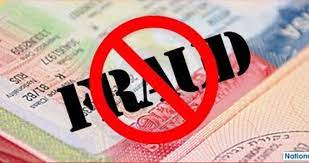Many people wishing to gain information about migrating to the U.S. may tend to seek help from the wrong source. Knowing and trusting a source is very vital. To do our part in reducing the rate of Visa scams, this blog is going to inform you about common immigration scams which you should avoid.
TPS Re-registration Scams
Do not purchase or submit any form till USCIS updates official TPS re-registration information for your country. Keep updated at uscis.gov/TPS.
Immigration Scam in India
Beware of emails supposedly sent by the USCIS New Delhi Field office or the Department of State in India. These emails might contain attachments, claim you have been approved for a visa to the U.S., or request cash for visa process. Emails like which will be scams because:
- Emails from the U.S. government invariably end in the domain “.gov”;
- USCIS can never send an email indicating you’ve been approved for a diversity visa, migrant visa, nonimmigrant visa, or the other style of immigration benefit; and
- USCIS can never ask you to transfer cash to an individual (see Payments by Phone or Email).
Please visit the Department of State’s website on fraud warnings for extra information.
Also read about How to Apply for a Green Card in the U.S.
Form I-9 and Email Scams
USCIS has learned that employers have received scam emails requesting form I-9 information that seem to come from USCIS. Employers aren’t needed to submit Forms I-9 to USCIS. Employers should have a form I-9, Employment Eligibility Verification, for each person on their payroll who is needed to finish form I-9.
All of these forms should be preserved for a particular amount of time. Visit I-9 Central to learn more regarding retention, storage and inspections for form I-9.
These scam emails come from a fraudulent email address: news@uscis.gov. This is definitely not a USCIS email address. The body of the e-mail might contain USCIS and office of the inspector general labels, your address and a fraudulent download button that links to a non-government web address (uscis-online.org).
Don’t reply to these emails or click the links in them.
If you suspect that you received a scam email requesting form I-9 information from USCIS, report it to the Federal Trade Commission. If you’re undecided if it’s a scam, forward the suspicious email to the USCIS webmaster.
USCIS will review the emails received and share with enforcement agencies as appropriate.
“Notarios Públicos”
In several Latin American countries, the term “notario publico” (which is Spanish for “notary public”) suggests that something terribly different than what it suggests that in the U.S.. In several spanish-speaking nations, “notarios” are powerful attorneys with special legal credentials.
In the U.S., however, notary publics are individuals appointed by state governments to witness the signing of necessary documents and administer oaths. A notario publico isn’t approved to supply you with any legal services associated with immigration.
Solely an attorney or an authorized representative working for a Department of Justice (DOJ)-recognized organization will provide you with legal advice. For additional info, visit the recognition & accreditation Program page on DOJ’s website.
Also read about How To Get A Job In The U.S. As A Foreigner
Payments by Phone or Email
USCIS can never ask you to transfer cash to an individual. we have a tendency to not settle for Western Union, MoneyGram, PayPal, or gift cards as payment for immigration fees. additionally, we’ll never ask you to pay fees to someone on the phone or by email.
You’ll be able to pay some immigration fees online, but as long as you pay through your USCIS online account and Pay.gov.
Remember, you’ll be able to learn more on our Paying USCIS Fees page.
Winning the Visa Lottery
USCIS doesn’t manage the diversity migrant Visa (DV) Program. This program is managed by the U.S. Department of State (State Department). The DV Program is also called the visa lottery.
Visit the State Department’s website to learn more regarding the program, the necessities to enter, and the way they notify selectees. Bear in mind that the DV Program is free and the State Department can never send you an email regarding being selected.
Scam Websites
Some websites claim to be related with USCIS and supply step-by-step guidance on finishing a USCIS application or petition. Ensure your information is from uscis.gov or is affiliated with uscis.gov. certify the website address ends with .gov.
Please keep in mind that we’ll never ask you to pay to download USCIS forms. Our forms are invariably free on our website. you’ll be able to also get forms at your local USCIS office. To order forms by mail, follow these directions in English or Spanish.
Also read about How To Apply For A Green Card In The U.S.
Job Offers
Beware of corporations offering employment from overseas or by email. If you receive a suspicious job offer by email before you leave your country to come to the U.S., it’s going to be a scam, particularly if you’re asked to pay cash to receive a job offer.
Even if a job offer is legitimate, you’re not allowed to work in the U.S. unless you possess a permanent resident card (Green Card), an Employment Authorization Document (work permit) or an employment-related visa that permits you to work for a specific employer. read the working in the U.S. page.
If you’re already in the U.S. on a student visa, talk with your foreign student advisor (designated school official) at your school before you take any job. If you’re about to graduate and are applying for nonmandatory practical training (OPT), read the directions on the working in the U.S. page.
Also read about How To Apply For A U.S. Work Permit
Scams Targeting Students
If you’re an international student outside of the U.S. and wish to come to the U.S. for education, ensure you’re applying to an authorized college or university. Search for your school on the Council for higher education web page.
You must have a form I-20, Certificate of Eligibility for Nonimmigrant Student status, to travel. once you’re accepted into a Student and Exchange visitor Program (SEVP)-certified school, a designated school official can either provide you:
- Form I-20, Certificate of Eligibility for Nonimmigrant (F-1) Student status –For academic and Language Students, or
- Form I-20, Certificate of Eligibility for Nonimmigrant (M-1) Student status –For vocational Students
Schools that aren’t accredited cannot sponsor you for an F-1 student visa.
Additional info on the form I-20 is accessible on DHS’ website studyinthestates.dhs.gov or on our website on the students and Employment page.
Paying cash for Connections or Jumping the line
Sometimes businesses and websites pretend to be immigration consultants or say they possess special connections to the govt.. they may conjointly “guarantee” that you will get a visa, Green Card, or work permit quicker if you pay a fee.
Remember, USCIS has no exceptions to the normal processing times and nobody can get these services quicker than the standard method. Check case processing times online.
If you receive a suspicious email, forward it to USA at USCIS.Webmaster@uscis.dhs.gov.



